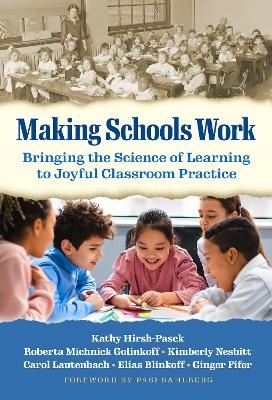
Making Schools Work
Teachers' College Press (Verlag)
978-0-8077-6739-9 (ISBN)
- Titel z.Zt. nicht lieferbar
- Versandkostenfrei innerhalb Deutschlands
- Auch auf Rechnung
- Verfügbarkeit in der Filiale vor Ort prüfen
- Artikel merken
If we teach in the way that human brains learn, both students and their teachers will thrive! This book aligns evidence from the learning sciences on how and what students need to learn with classroom practice (pre-K–12). It demonstrates, with hands-on examples, how a change in educational mindset (rather than in curriculum) can improve student outcomes on both standardized tests and a breadth of 21st-century skills. Written collectively by classroom teachers, administrators, parents, and learning scientists, this book shows readers how to co-construct and reimagine an optimal educational system. Making Schools Work offers three case studies of schools, including a statewide system, that are all realizing a 6 Cs approach to learning focused on collaboration, communication, content, critical thinking, creative innovation, and confidence. The text documents the ever-evolving implementation process, as well as outcomes and the ongoing work of stakeholders. Readers can use this resource to create an education for all children that is culturally responsive, inclusive, effective, and fun.
Making Schools Work is not an ordinary book about re-imagining education. It is a theory, a plan, an implementation strategy, and a series of case studies to show you just how to change your educational mindset.
Book Features:
Shows how to apply the 6 Cs and playful learning principles to what goes on in the classroom every day.
Jointly written in accessible language by a team of experts from teachers to educational administrators, to museum educators to learning scientists.
Offers hands-on ways to reimagine classrooms without investing in new curricula.
Puts teachers in the driver’s seat, reminding them of why they teach.
Provides culturally responsive, inclusive, effective, and fun strategies.
Offers children the possibility of learning the skills they will need for 21st-century success.
Kathy Hirsh-Pasek is a professor of psychology at Temple University and a senior fellow at the Brookings Institution. Roberta Michnick Golinkoff is the Unidel H. Rodney Sharp Professor of Education at the University of Delaware. Kimberly Nesbitt is an associate professor in the Department of Human Development and Family Studies at the University of New Hampshire. Carol Lautenbach is assistant superintendent for teaching and learning design (retired) in the Godfrey-Lee Public Schools (Wyoming, MI). Elias Blinkoff is a graduate student in developmental psychology at Temple University. Ginger Fifer is a past teacher and school administrator at Friends’ Central School (Wynnewood, PA).
Contents
Foreword xiii
Acknowledgments xvii
1. Why Now? 1
Looking Ahead 5
2. The Science of Success 7
At a Glance 7
Introduction 7
The How of Learning 11
What Children Learn: A Breadth-of-Skills Approach Through the 6 Cs 24
Where the How Meets the What of Learning 31
3. Case Study 1: The 6 Cs Go to an Independent School in Pennsylvania 34
At a Glance 34
Introduction 34
A Theme-Based Approach as One Embodiment of the 6 Cs System 38
Themes, the 6 Cs, and the Principles of Playful Learning 48
4. Case Study 2: Designing for Equity in a Michigan School District 49
At a Glance 49
Introduction 50
Using Human-Centered Design After Exploring the Underlying Barriers 52
Results: The System Shifts Toward Success for All 67
Next Steps to Intensify Learning 68
Slow Down to Speed Up 69
5. Case Study 3: Statewide Scale-Up of Playful Learning in New Hampshire Kindergarten Classrooms 71
At a Glance 71
Introduction 71
Motivation for Change 73
Evidence-Based Approach for Change 74
Impacts and Outcomes 80
Guided Play in COVID-19 Classrooms 83
Further Investment in Guided Play and Coaching 83
Conclusion 85
Chapter 5 Supplemental Resources 86
6. Bringing It Home: Adapting the Model for Your School 97
Step 1: Get Buy-In 101
Step 2: Educate 101
Step 3: Co-Design 102
Step 4: Try It Out 103
Step 5: Broaden Your Scope 103
Step 6: Assess How It Is Going 104
Step 7: Home and School 105
Step 8: Have a School- or Grade-Wide Conclusion 105
7. Authentic Assessment to Support the Science of Learning 106
At a Glance 106
Introduction 106
Motivation: Why Engage in Assessment? 107
Measurement of the Knowledge and Skills That Matter 108
Developmentally Appropriate Assessment 109
Summative and Formative Assessment 110
There Is More Than One Type of Authentic Assessment 115
Clantete: Using Authentic Assessment to Support the 6 Cs 122
Radnor Middle School: Authentic Assessment to Support Student Learning 123
Conclusion 124
8. Jumping Over School Walls: The 6 Cs and Learning Principles Are Everywhere 125
At a Glance 125
Introduction 125
Enter Playful Learning Landscapes: Informal Learning at Its Best 126
Media: The Learning Principles and the 6 Cs Work Here, Too 129
Conclusion 134
9. Re-Imagining Education at Your School 135
Introduction 136
The 6 Cs Prepare Students for Success 136
How Can We Help Children Remember What They Learn So That It Is Sticky? 138
How Do We Teach in a Way That Supports Transfer? 139
How Do We Move From the “Memorize and Spit-It-Out-on-the-Test” Model to One in Which Students Are More Engaged in Their Learning? 139
Appendix A: Visual Chapter Synopses 145
Appendix B: Recommendations for Further Study 159
References 163
Index 179
About the Authors 185
| Erscheinungsdatum | 31.10.2022 |
|---|---|
| Verlagsort | New York |
| Sprache | englisch |
| Maße | 162 x 235 mm |
| Gewicht | 413 g |
| Themenwelt | Sozialwissenschaften ► Pädagogik ► Allgemeines / Lexika |
| Sozialwissenschaften ► Pädagogik ► Bildungstheorie | |
| ISBN-10 | 0-8077-6739-5 / 0807767395 |
| ISBN-13 | 978-0-8077-6739-9 / 9780807767399 |
| Zustand | Neuware |
| Informationen gemäß Produktsicherheitsverordnung (GPSR) | |
| Haben Sie eine Frage zum Produkt? |
aus dem Bereich


